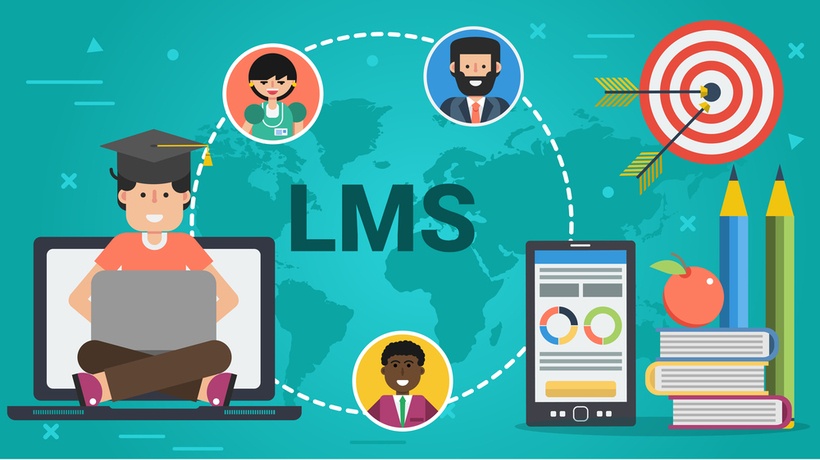Important Criteria To Help You Select An LMS Software Provider
Selecting an LMS software provider is like picking a spouse. You will be in regular contact with your LMS software provider and your company will rely on their advice, technical support and training. Your relationship with your LMS software provider can make or break your LMS. The free eBook LMS Buyer's Kit by Expertus was created to offer insight into fundamental criteria toward selection of the most appropriate LMS software provider.
1. What Are Your Learning Management System Options?
There are oodles of LMS options for you to choose from! In my opinion, there are many Learning Management Systems that are viable options. It just depends on what your company needs from an LMS.
There are a lot of ways you can identify possible LMS options. Firstly, you can ask your contacts at other companies what systems they recommend. You can also read reports and research from respected learning analysts. If you are a member of the American Society of Training & Development, you can utilize your member resources. Last but not least, you could also read a few news articles and run a few Internet searches to get an idea of which LMSs are popular and why.
As we go further into this section we will discuss the many traits of an excellent LMS software provider.
There are certain factors you should definitely look for in an LMS software provider. To begin with, timely customer service and knowledgeable technical support are inarguably two of the most important. Pay attention to how many technical support representatives the LMS software provider has. There also needs to be a certain willingness to customize the LMS to your company and make changes as needed. A creative company mindset and a desire to innovate are absolute must-haves. And then of course, it’s good to have minimal system downtime and a lack of major technical issues. Check how long the company has been in business and the size of its customer base. Financial stability and company reputation are factors you should definitely keep in mind.
What’s more, a good LMS software provider is one that offers security features and regular data back-ups. In migrating from your current LMS, importing your existing LMS data can be a huge relief, so look for that. Also, software features that support your company’s objectives are another must-have.
2. Is The LMS Software Provider Successful?
Implementing an LMS requires a lot of hard to work. Ideally, you don’t want to implement another LMS for a few years or more. Is the LMS software provider financially stable? Are they respected within the Learning & Development industry?
In addition, has this software provider worked with companies of similar size to yours? Is the company offering any other software or services that would potentially support your company’s growth in the future? Check out potential LMS software providers by searching the Internet. Can you find any articles or analyst reports that suggest the LMS software provider is working on new innovations?
3. What Kind Of Customer Service Experience Can You Expect?
You are about to start a long-term relationship with your LMS software provider’s Customer Service department. Talk to other companies who are currently using the LMS software provider’s products. Does the Customer Service department respond to requests quickly? Are there frequent technical issues and downtime? Your LMS should work for you, not the other way around!
Contact at least two companies currently using the services of each LMS software provider you are considering. Ask about each Learning Management System’s reliability, number of glitches and amount of downtime. Don’t neglect to learn whether users have had an easy time adapting to the LMS’ interface. Ask if the LMS software provider has been responsive to technical support requests. If you can speak with companies that are the same approximate size as your company, it’s even better.
4. Does The LMS Software Provider Offer The Features Your Company Needs?
Once you have done some research on your LMS options, you will want to contact each LMS software provider. Ask questions about any negative insights provided by their references. Tell the provider your objectives and listen for how the LMS can help your company achieve their goals. It’s important to hear what each LMS software provider has to say about their LMS. However, you should also have a list of questions based on your company’s needs.
It is also advisable to find out if the LMS software provider is willing and able to customize your LMS and in what ways. Ask them to show you examples of corporate Learning Management Systems they have designed so you can get an idea of what they have to offer. The free eBook LMS Buyer's Kit presents a list of the top 50 Learning Management Systems for the year 2016. This list showcases all LMS features you should be aware of to make a well-substantiated LMS choice.
5. How Long Will It Take To Build Your LMS And Make It Available To Employees?
Once you have spoken with potential LMS software providers and asked your initial questions, you should have an idea of which provider may be the best match. Follow-up questions for your LMS software provider are presented in the remainder of this section. Asking these questions will hopefully confirm that the software provider is indeed the right match for your company. Ask your LMS software provider how long it will take to implement your LMS. The timeframe will vary greatly depending on the amount of customization that you are requesting.
If you are currently using an LMS and are simply switching to a new one, there will be a process to convert data from your old LMS into a format you can import into your new LMS. This process can be extremely easy or extremely difficult depending on the compatibility between your old and new LMS. The information transferred from your old to your new LMS will include training data and possibly employee information. The import of training data will include information about the courses that existed in your old LMS, as well as employee transcripts.
Ask your LMS software provider exactly what information will be imported, especially if your old LMS was used to deliver compliance courses. You will want to be sure the records of those past courses are fully accessible in case you need them for legal purposes.
In order to create accounts for your LMS users, a variety of employment information may be imported into the LMS and in many ways. If your LMS has the capability of integrating with your existing Human Resource Management System, your LMS software provider may simply connect the two systems. The employment information will then flow into your LMS from the HRMS/HRIS system. Tell your LMS software provider what type of HR software you have, and let them tell you what the import process looks like.
The employment information stored in your LMS will prove useful when you begin assigning trainings aimed at specific segments of employees. For example, let’s say a particular compliance training must be completed on an employee’s hire date. If your employees’ hire dates are imported into the LMS, you can program most systems to automatically reassign the compliance training, on the correct date, every two years to every single employee! Talk about a major time-saver!
6. Will You Deliver Sensitive Content Through The LMS And What Security Features Will You Implement?
If your LMS will deliver training content that contains sensitive information, you may want to consider whether you want the LMS to be available to employees from home. In other words, you may want to have your LMS live on your company network rather than on the Internet.
This point is discussed earlier in the LMS Buyer's Kit eBook, but it is worth revisiting with your LMS software provider before you make final decisions on LMS implementation. Also, ask what other security measures your software provider can implement for extra protection. How would implementing these security features affect the amount of time needed to implement your LMS?
7. Are You Going To Maintain The LMS On Your Own Server Or Use The LMS Software Provider’s Server?
Some LMS software providers require that you use their server for proprietary reasons. There will be a cost associated with the server space provided to you. Ask your LMS software provider for their policy and associated costs. Also, ask where your LMS software provider’s servers are located. It’s always helpful when your LMS software provider has servers and back-up servers in two separate locations. If a natural disaster occurs near one set of servers, your company’s data will still be safe on the other set of servers.
8. Do You Have Data Back-Ups In Place?
Your Learning Management System will store a great deal of information about employees. It may also store information about compliance trainings that your company needs for legal purposes. Ask your LMS software provider what type of data back-ups they offer. How often will the back-ups take place? How easy will it be to restore data in the event of an LMS failure or natural disaster?
Knowing what to look for in an LMS software provider can play a decisive role in finding the right fit. Not all companies have the same needs, especially when it comes to selecting an LMS. As a result, it’s vital that you come prepared with a basic set of criteria that will allow you to make an informed decision.
Download the free eBook LMS Buyer's Kit and get informed on important questions to help you analyze your company’s LMS selection needs. The LMS Buyer’s Kit will additionally educate you on convincing arguments you can use to achieve LMS implementation funding.









